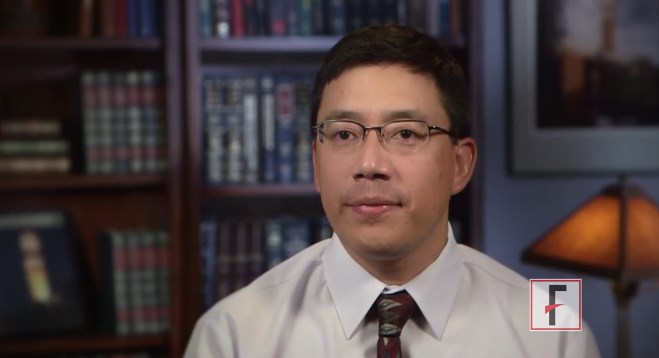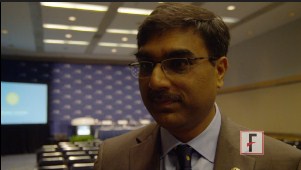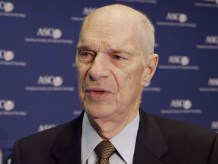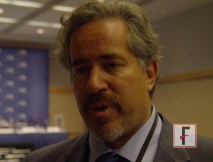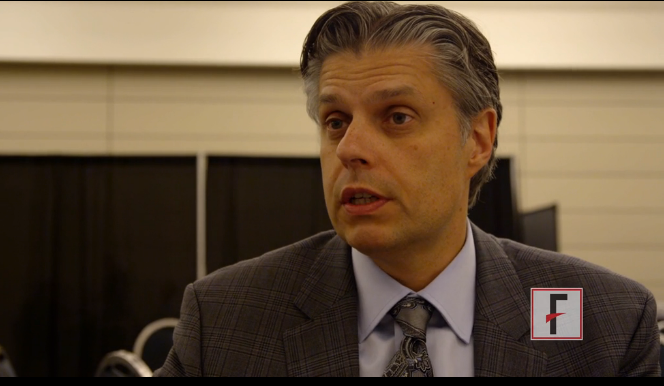User login
Terry Rudd has covered clinical news and health policy as a reporter and editor since 1994.
VIDEO: Gut microbiota may predict C. diff treatment response
HONOLULU – Could gut microbiota be a better predictor than clinical factors of a patient’s response to treatment for Clostridium difficile infection?
In a study of 88 patients with C. difficile, the overall treatment failure rate was 12.5% – but clinical factors such as age, sex, ongoing antibiotic exposure, and hospitalization status failed to predict which patients wouldn’t respond to treatment.
So, “we aimed to identify if there are any gut microbiota signatures to predict treatment response and treatment failure,” explained the study’s lead author, Dr. Sahil Khanna of the Mayo Clinic, Rochester, Minn.
In an interview at the annual meeting of the American College of Gastroenterology, Dr. Khanna discussed the study results and why gut microbiota may be an effective predictor of treatment responders and nonresponders.
The video associated with this article is no longer available on this site. Please view all of our videos on the MDedge YouTube channel
HONOLULU – Could gut microbiota be a better predictor than clinical factors of a patient’s response to treatment for Clostridium difficile infection?
In a study of 88 patients with C. difficile, the overall treatment failure rate was 12.5% – but clinical factors such as age, sex, ongoing antibiotic exposure, and hospitalization status failed to predict which patients wouldn’t respond to treatment.
So, “we aimed to identify if there are any gut microbiota signatures to predict treatment response and treatment failure,” explained the study’s lead author, Dr. Sahil Khanna of the Mayo Clinic, Rochester, Minn.
In an interview at the annual meeting of the American College of Gastroenterology, Dr. Khanna discussed the study results and why gut microbiota may be an effective predictor of treatment responders and nonresponders.
The video associated with this article is no longer available on this site. Please view all of our videos on the MDedge YouTube channel
HONOLULU – Could gut microbiota be a better predictor than clinical factors of a patient’s response to treatment for Clostridium difficile infection?
In a study of 88 patients with C. difficile, the overall treatment failure rate was 12.5% – but clinical factors such as age, sex, ongoing antibiotic exposure, and hospitalization status failed to predict which patients wouldn’t respond to treatment.
So, “we aimed to identify if there are any gut microbiota signatures to predict treatment response and treatment failure,” explained the study’s lead author, Dr. Sahil Khanna of the Mayo Clinic, Rochester, Minn.
In an interview at the annual meeting of the American College of Gastroenterology, Dr. Khanna discussed the study results and why gut microbiota may be an effective predictor of treatment responders and nonresponders.
The video associated with this article is no longer available on this site. Please view all of our videos on the MDedge YouTube channel
At ACG 2015
VIDEO: Flu shot lowered hospitalization risk for influenza pneumonia
Getting a flu shot may be a highly effective method to prevent hospitalization for influenza-associated pneumonia.
That’s according to researchers who found that patients hospitalized with influenza-associated pneumonia were more likely to not have been vaccinated than patients whose pneumonia was due to other causes.
In video interviews, Dr. Kathryn M. Edwards and Dr. Carlos G. Grijalva of Vanderbilt University, Nashville, discussed their study of patients admitted through the emergency department for pneumonia and the benefits of flu vaccination in preventing hospitalization for influenza pneumonia.
The video associated with this article is no longer available on this site. Please view all of our videos on the MDedge YouTube channel
Getting a flu shot may be a highly effective method to prevent hospitalization for influenza-associated pneumonia.
That’s according to researchers who found that patients hospitalized with influenza-associated pneumonia were more likely to not have been vaccinated than patients whose pneumonia was due to other causes.
In video interviews, Dr. Kathryn M. Edwards and Dr. Carlos G. Grijalva of Vanderbilt University, Nashville, discussed their study of patients admitted through the emergency department for pneumonia and the benefits of flu vaccination in preventing hospitalization for influenza pneumonia.
The video associated with this article is no longer available on this site. Please view all of our videos on the MDedge YouTube channel
Getting a flu shot may be a highly effective method to prevent hospitalization for influenza-associated pneumonia.
That’s according to researchers who found that patients hospitalized with influenza-associated pneumonia were more likely to not have been vaccinated than patients whose pneumonia was due to other causes.
In video interviews, Dr. Kathryn M. Edwards and Dr. Carlos G. Grijalva of Vanderbilt University, Nashville, discussed their study of patients admitted through the emergency department for pneumonia and the benefits of flu vaccination in preventing hospitalization for influenza pneumonia.
The video associated with this article is no longer available on this site. Please view all of our videos on the MDedge YouTube channel
FROM JAMA
VIDEO: Ibrutinib should be therapy ‘backbone’ in relapsed CLL
CHICAGO – Combining ibrutinib with standard chemoimmunotherapy extended progression-free survival in patients with relapsed chronic lymphocytic leukemia (CLL), according to interim results from the HELIOS trial.
In fact, while median progression-free survival was approximately 13 months in the placebo arm, the median progression-free survival had not been reached yet in the study’s ibrutinib arm, explained lead study author Dr. Asher Chanan-Khan.
“I believe that ibrutinib has now become the backbone of treatment of patients with relapsed CLL,” said Dr. Chanan-Khan, professor of medicine at the Mayo Clinic in Jacksonville, Fla.
In a video interview at the annual meeting of the American Society of Clinical Oncology, Dr. Chanan-Khan discussed ibrutinib’s significant impact on the risk of progression and death, even in the presence of factors associated with aggressive disease or poor outcome.
The video associated with this article is no longer available on this site. Please view all of our videos on the MDedge YouTube channel
CHICAGO – Combining ibrutinib with standard chemoimmunotherapy extended progression-free survival in patients with relapsed chronic lymphocytic leukemia (CLL), according to interim results from the HELIOS trial.
In fact, while median progression-free survival was approximately 13 months in the placebo arm, the median progression-free survival had not been reached yet in the study’s ibrutinib arm, explained lead study author Dr. Asher Chanan-Khan.
“I believe that ibrutinib has now become the backbone of treatment of patients with relapsed CLL,” said Dr. Chanan-Khan, professor of medicine at the Mayo Clinic in Jacksonville, Fla.
In a video interview at the annual meeting of the American Society of Clinical Oncology, Dr. Chanan-Khan discussed ibrutinib’s significant impact on the risk of progression and death, even in the presence of factors associated with aggressive disease or poor outcome.
The video associated with this article is no longer available on this site. Please view all of our videos on the MDedge YouTube channel
CHICAGO – Combining ibrutinib with standard chemoimmunotherapy extended progression-free survival in patients with relapsed chronic lymphocytic leukemia (CLL), according to interim results from the HELIOS trial.
In fact, while median progression-free survival was approximately 13 months in the placebo arm, the median progression-free survival had not been reached yet in the study’s ibrutinib arm, explained lead study author Dr. Asher Chanan-Khan.
“I believe that ibrutinib has now become the backbone of treatment of patients with relapsed CLL,” said Dr. Chanan-Khan, professor of medicine at the Mayo Clinic in Jacksonville, Fla.
In a video interview at the annual meeting of the American Society of Clinical Oncology, Dr. Chanan-Khan discussed ibrutinib’s significant impact on the risk of progression and death, even in the presence of factors associated with aggressive disease or poor outcome.
The video associated with this article is no longer available on this site. Please view all of our videos on the MDedge YouTube channel
AT THE 2015 ASCO ANNUAL MEETING
VIDEO: Consider cost in anastrozole vs. tamoxifen for DCIS
CHICAGO – Anastrozole may top tamoxifen in reducing the risk of disease recurrence in postmenopausal ductal carcinoma in situ (DCIS), particularly in younger women, but which drug holds a cost advantage?
“How much do you want to pay in dollars or in side effects to achieve the extra benefit is an individual decision that a woman has to make with her physician,” said Dr. Richard Margolese, professor of surgical oncology at Jewish General Hospital, McGill University, Montreal.
In a video interview at the annual meeting of the American Society of Clinical Oncology, Dr. Margolese discussed the cost and side effect considerations that could determine a decision between anastrozole and tamoxifen.
The video associated with this article is no longer available on this site. Please view all of our videos on the MDedge YouTube channel
CHICAGO – Anastrozole may top tamoxifen in reducing the risk of disease recurrence in postmenopausal ductal carcinoma in situ (DCIS), particularly in younger women, but which drug holds a cost advantage?
“How much do you want to pay in dollars or in side effects to achieve the extra benefit is an individual decision that a woman has to make with her physician,” said Dr. Richard Margolese, professor of surgical oncology at Jewish General Hospital, McGill University, Montreal.
In a video interview at the annual meeting of the American Society of Clinical Oncology, Dr. Margolese discussed the cost and side effect considerations that could determine a decision between anastrozole and tamoxifen.
The video associated with this article is no longer available on this site. Please view all of our videos on the MDedge YouTube channel
CHICAGO – Anastrozole may top tamoxifen in reducing the risk of disease recurrence in postmenopausal ductal carcinoma in situ (DCIS), particularly in younger women, but which drug holds a cost advantage?
“How much do you want to pay in dollars or in side effects to achieve the extra benefit is an individual decision that a woman has to make with her physician,” said Dr. Richard Margolese, professor of surgical oncology at Jewish General Hospital, McGill University, Montreal.
In a video interview at the annual meeting of the American Society of Clinical Oncology, Dr. Margolese discussed the cost and side effect considerations that could determine a decision between anastrozole and tamoxifen.
The video associated with this article is no longer available on this site. Please view all of our videos on the MDedge YouTube channel
AT THE 2015 ASCO ANNUAL MEETING
VIDEO: Pacritinib safe with thrombocytopenia in myelofibrosis
CHICAGO – The investigational oral Janus kinase 2 (JAK2) inhibitor pacritinib may offer a new myelofibrosis treatment option for patients with baseline thrombocytopenia.
Analyses from an ongoing phase III trial of pacritinib, reported at the annual meeting of the American Society of Clinical Oncology, indicate that the JAK2 inhibitor is superior to best available therapy for alleviating splenomegaly and other symptoms of myelofibrosis.
“In the very short term, it very clearly identifies a therapy that’s very impactful for those individuals with significant thrombocytopenia and potentially those with anemia,” noted lead study author Dr. Ruben A. Mesa, deputy director of the Mayo Clinic Cancer Center in Scottsdale, Ariz.
In a video interview, Dr. Mesa discussed the study findings so far and the potential implications for patients with myelofibrosis.
The video associated with this article is no longer available on this site. Please view all of our videos on the MDedge YouTube channel
CHICAGO – The investigational oral Janus kinase 2 (JAK2) inhibitor pacritinib may offer a new myelofibrosis treatment option for patients with baseline thrombocytopenia.
Analyses from an ongoing phase III trial of pacritinib, reported at the annual meeting of the American Society of Clinical Oncology, indicate that the JAK2 inhibitor is superior to best available therapy for alleviating splenomegaly and other symptoms of myelofibrosis.
“In the very short term, it very clearly identifies a therapy that’s very impactful for those individuals with significant thrombocytopenia and potentially those with anemia,” noted lead study author Dr. Ruben A. Mesa, deputy director of the Mayo Clinic Cancer Center in Scottsdale, Ariz.
In a video interview, Dr. Mesa discussed the study findings so far and the potential implications for patients with myelofibrosis.
The video associated with this article is no longer available on this site. Please view all of our videos on the MDedge YouTube channel
CHICAGO – The investigational oral Janus kinase 2 (JAK2) inhibitor pacritinib may offer a new myelofibrosis treatment option for patients with baseline thrombocytopenia.
Analyses from an ongoing phase III trial of pacritinib, reported at the annual meeting of the American Society of Clinical Oncology, indicate that the JAK2 inhibitor is superior to best available therapy for alleviating splenomegaly and other symptoms of myelofibrosis.
“In the very short term, it very clearly identifies a therapy that’s very impactful for those individuals with significant thrombocytopenia and potentially those with anemia,” noted lead study author Dr. Ruben A. Mesa, deputy director of the Mayo Clinic Cancer Center in Scottsdale, Ariz.
In a video interview, Dr. Mesa discussed the study findings so far and the potential implications for patients with myelofibrosis.
The video associated with this article is no longer available on this site. Please view all of our videos on the MDedge YouTube channel
AT THE 2015 ASCO ANNUAL MEETING
ABIM’s Baron fires back after latest Newsweek salvo
The increasingly personal clash between Newsweek and the American Board of Internal Medicine reached a new level on May 21, with the release of another Newsweek article parsing ABIM’s finances and a swift letter of response by ABIM’s president.
Newsweek reporter Kurt Eichenwald’s latest in a series of sharply critical articles about the board, “Medical Mystery: Making Sense of ABIM’s Financial Report,” plunged into the organization’s latest IRS financial filings to retrieve pay estimates for top officials, including ABIM President and CEO Dr. Richard J. Baron. (Newsweek’s estimate for Dr. Baron’s annualized compensation: $860,926.)
Mr. Eichenwald also called on Congress and federal regulators to investigate the ABIM’s financial books and curb its market power. “It is time for Congress to investigate the ABIM and force these millionaires to prove they aren’t damaging America’s health care system for personal profit,” he wrote.
ABIM fired back almost immediately. In an open letter to ABIM diplomates on May 22, Dr. Baron defended ABIM’s bookkeeping and questioned Mr. Eichenwald’s motives.
Dr. Baron began by acknowledging the ongoing criticism of ABIM’s maintenance of certification program – “much of it critical; a lot of it valid.”
But he also cited “considerable inaccurate information” in an earlier Newsweek article about ABIM, as well as failure by Mr. Eichenwald and Newsweek to respond to ABIM’s concerns about the article’s accuracy. That prompted ABIM to decide not to work with Mr. Eichenwald. ABIM did talk with other publications that are investigating the organization, Dr. Baron added. “Some of the articles that resulted from those interviews were critical of ABIM, but we cooperated because the reporters acted professionally and in good faith.”
Dr. Baron defended himself and the ABIM against “two of the most egregious and misleading charges” in the Newsweek articles. “First, we have never made any effort to obfuscate, hide or delay ABIM’s financial information,” he countered.
And as for his own pay?
“Second, no one is trying to hide salaries. I earned $688,000 in compensation in 2014 and $55,000 in deferred compensation.”
On Twitter @IntMedNews
The increasingly personal clash between Newsweek and the American Board of Internal Medicine reached a new level on May 21, with the release of another Newsweek article parsing ABIM’s finances and a swift letter of response by ABIM’s president.
Newsweek reporter Kurt Eichenwald’s latest in a series of sharply critical articles about the board, “Medical Mystery: Making Sense of ABIM’s Financial Report,” plunged into the organization’s latest IRS financial filings to retrieve pay estimates for top officials, including ABIM President and CEO Dr. Richard J. Baron. (Newsweek’s estimate for Dr. Baron’s annualized compensation: $860,926.)
Mr. Eichenwald also called on Congress and federal regulators to investigate the ABIM’s financial books and curb its market power. “It is time for Congress to investigate the ABIM and force these millionaires to prove they aren’t damaging America’s health care system for personal profit,” he wrote.
ABIM fired back almost immediately. In an open letter to ABIM diplomates on May 22, Dr. Baron defended ABIM’s bookkeeping and questioned Mr. Eichenwald’s motives.
Dr. Baron began by acknowledging the ongoing criticism of ABIM’s maintenance of certification program – “much of it critical; a lot of it valid.”
But he also cited “considerable inaccurate information” in an earlier Newsweek article about ABIM, as well as failure by Mr. Eichenwald and Newsweek to respond to ABIM’s concerns about the article’s accuracy. That prompted ABIM to decide not to work with Mr. Eichenwald. ABIM did talk with other publications that are investigating the organization, Dr. Baron added. “Some of the articles that resulted from those interviews were critical of ABIM, but we cooperated because the reporters acted professionally and in good faith.”
Dr. Baron defended himself and the ABIM against “two of the most egregious and misleading charges” in the Newsweek articles. “First, we have never made any effort to obfuscate, hide or delay ABIM’s financial information,” he countered.
And as for his own pay?
“Second, no one is trying to hide salaries. I earned $688,000 in compensation in 2014 and $55,000 in deferred compensation.”
On Twitter @IntMedNews
The increasingly personal clash between Newsweek and the American Board of Internal Medicine reached a new level on May 21, with the release of another Newsweek article parsing ABIM’s finances and a swift letter of response by ABIM’s president.
Newsweek reporter Kurt Eichenwald’s latest in a series of sharply critical articles about the board, “Medical Mystery: Making Sense of ABIM’s Financial Report,” plunged into the organization’s latest IRS financial filings to retrieve pay estimates for top officials, including ABIM President and CEO Dr. Richard J. Baron. (Newsweek’s estimate for Dr. Baron’s annualized compensation: $860,926.)
Mr. Eichenwald also called on Congress and federal regulators to investigate the ABIM’s financial books and curb its market power. “It is time for Congress to investigate the ABIM and force these millionaires to prove they aren’t damaging America’s health care system for personal profit,” he wrote.
ABIM fired back almost immediately. In an open letter to ABIM diplomates on May 22, Dr. Baron defended ABIM’s bookkeeping and questioned Mr. Eichenwald’s motives.
Dr. Baron began by acknowledging the ongoing criticism of ABIM’s maintenance of certification program – “much of it critical; a lot of it valid.”
But he also cited “considerable inaccurate information” in an earlier Newsweek article about ABIM, as well as failure by Mr. Eichenwald and Newsweek to respond to ABIM’s concerns about the article’s accuracy. That prompted ABIM to decide not to work with Mr. Eichenwald. ABIM did talk with other publications that are investigating the organization, Dr. Baron added. “Some of the articles that resulted from those interviews were critical of ABIM, but we cooperated because the reporters acted professionally and in good faith.”
Dr. Baron defended himself and the ABIM against “two of the most egregious and misleading charges” in the Newsweek articles. “First, we have never made any effort to obfuscate, hide or delay ABIM’s financial information,” he countered.
And as for his own pay?
“Second, no one is trying to hide salaries. I earned $688,000 in compensation in 2014 and $55,000 in deferred compensation.”
On Twitter @IntMedNews
Is It IBS? Blood Test May Offer Conclusive Answer
WASHINGTON – A new blood test could conclusively determine if a patient with chronic diarrhea has diarrhea-predominant irritable bowel syndrome (D-IBS).
The IBSchek blood test detects the presence of antibodies to cytolethal distending toxin B and vinculin. In a study presented at the annual Digestive Disease Week and published in PLoS ONE, the positive predictive value for D-IBS of just one of the antibodies was greater than 98%, explained study lead author Dr. Mark Pimentel of Cedars-Sinai Medical Center, Los Angeles. If the test is positive for both antibodies, “the post-test probability is 95% that you have IBS.”
In a video interview, Dr. Pimentel discussed the study’s findings and the potential impact for physicians and patients. The search for diagnostic answers leads to “a lot of doctor-shopping, certainly a lot of colonoscopies and unnecessary testing that are always negative with these patients,” he noted. “Maybe this will put an end to that.
“People used to think this is all psychological,” Dr. Pimentel added. “Now we can say, No, it’s organic. There’s something real going on; I’ve got a test that proves that.”
Dr. Pimentel has received consulting fees from Commonwealth Laboratories, which makes the IBSchek blood test.
The video associated with this article is no longer available on this site. Please view all of our videos on the MDedge YouTube channel
WASHINGTON – A new blood test could conclusively determine if a patient with chronic diarrhea has diarrhea-predominant irritable bowel syndrome (D-IBS).
The IBSchek blood test detects the presence of antibodies to cytolethal distending toxin B and vinculin. In a study presented at the annual Digestive Disease Week and published in PLoS ONE, the positive predictive value for D-IBS of just one of the antibodies was greater than 98%, explained study lead author Dr. Mark Pimentel of Cedars-Sinai Medical Center, Los Angeles. If the test is positive for both antibodies, “the post-test probability is 95% that you have IBS.”
In a video interview, Dr. Pimentel discussed the study’s findings and the potential impact for physicians and patients. The search for diagnostic answers leads to “a lot of doctor-shopping, certainly a lot of colonoscopies and unnecessary testing that are always negative with these patients,” he noted. “Maybe this will put an end to that.
“People used to think this is all psychological,” Dr. Pimentel added. “Now we can say, No, it’s organic. There’s something real going on; I’ve got a test that proves that.”
Dr. Pimentel has received consulting fees from Commonwealth Laboratories, which makes the IBSchek blood test.
The video associated with this article is no longer available on this site. Please view all of our videos on the MDedge YouTube channel
WASHINGTON – A new blood test could conclusively determine if a patient with chronic diarrhea has diarrhea-predominant irritable bowel syndrome (D-IBS).
The IBSchek blood test detects the presence of antibodies to cytolethal distending toxin B and vinculin. In a study presented at the annual Digestive Disease Week and published in PLoS ONE, the positive predictive value for D-IBS of just one of the antibodies was greater than 98%, explained study lead author Dr. Mark Pimentel of Cedars-Sinai Medical Center, Los Angeles. If the test is positive for both antibodies, “the post-test probability is 95% that you have IBS.”
In a video interview, Dr. Pimentel discussed the study’s findings and the potential impact for physicians and patients. The search for diagnostic answers leads to “a lot of doctor-shopping, certainly a lot of colonoscopies and unnecessary testing that are always negative with these patients,” he noted. “Maybe this will put an end to that.
“People used to think this is all psychological,” Dr. Pimentel added. “Now we can say, No, it’s organic. There’s something real going on; I’ve got a test that proves that.”
Dr. Pimentel has received consulting fees from Commonwealth Laboratories, which makes the IBSchek blood test.
The video associated with this article is no longer available on this site. Please view all of our videos on the MDedge YouTube channel
AT DDW 2015
VIDEO: Is it IBS? Blood test may offer conclusive answer
WASHINGTON – A new blood test could conclusively determine if a patient with chronic diarrhea has diarrhea-predominant irritable bowel syndrome (D-IBS).
The IBSchek blood test detects the presence of antibodies to cytolethal distending toxin B and vinculin. In a study presented at the annual Digestive Disease Week and published in PLoS ONE, the positive predictive value for D-IBS of just one of the antibodies was greater than 98%, explained study lead author Dr. Mark Pimentel of Cedars-Sinai Medical Center, Los Angeles. If the test is positive for both antibodies, “the post-test probability is 95% that you have IBS.”
In a video interview, Dr. Pimentel discussed the study’s findings and the potential impact for physicians and patients. The search for diagnostic answers leads to “a lot of doctor-shopping, certainly a lot of colonoscopies and unnecessary testing that are always negative with these patients,” he noted. “Maybe this will put an end to that.
“People used to think this is all psychological,” Dr. Pimentel added. “Now we can say, No, it’s organic. There’s something real going on; I’ve got a test that proves that.”
Dr. Pimentel has received consulting fees from Commonwealth Laboratories, which makes the IBSchek blood test.
The video associated with this article is no longer available on this site. Please view all of our videos on the MDedge YouTube channel
WASHINGTON – A new blood test could conclusively determine if a patient with chronic diarrhea has diarrhea-predominant irritable bowel syndrome (D-IBS).
The IBSchek blood test detects the presence of antibodies to cytolethal distending toxin B and vinculin. In a study presented at the annual Digestive Disease Week and published in PLoS ONE, the positive predictive value for D-IBS of just one of the antibodies was greater than 98%, explained study lead author Dr. Mark Pimentel of Cedars-Sinai Medical Center, Los Angeles. If the test is positive for both antibodies, “the post-test probability is 95% that you have IBS.”
In a video interview, Dr. Pimentel discussed the study’s findings and the potential impact for physicians and patients. The search for diagnostic answers leads to “a lot of doctor-shopping, certainly a lot of colonoscopies and unnecessary testing that are always negative with these patients,” he noted. “Maybe this will put an end to that.
“People used to think this is all psychological,” Dr. Pimentel added. “Now we can say, No, it’s organic. There’s something real going on; I’ve got a test that proves that.”
Dr. Pimentel has received consulting fees from Commonwealth Laboratories, which makes the IBSchek blood test.
The video associated with this article is no longer available on this site. Please view all of our videos on the MDedge YouTube channel
WASHINGTON – A new blood test could conclusively determine if a patient with chronic diarrhea has diarrhea-predominant irritable bowel syndrome (D-IBS).
The IBSchek blood test detects the presence of antibodies to cytolethal distending toxin B and vinculin. In a study presented at the annual Digestive Disease Week and published in PLoS ONE, the positive predictive value for D-IBS of just one of the antibodies was greater than 98%, explained study lead author Dr. Mark Pimentel of Cedars-Sinai Medical Center, Los Angeles. If the test is positive for both antibodies, “the post-test probability is 95% that you have IBS.”
In a video interview, Dr. Pimentel discussed the study’s findings and the potential impact for physicians and patients. The search for diagnostic answers leads to “a lot of doctor-shopping, certainly a lot of colonoscopies and unnecessary testing that are always negative with these patients,” he noted. “Maybe this will put an end to that.
“People used to think this is all psychological,” Dr. Pimentel added. “Now we can say, No, it’s organic. There’s something real going on; I’ve got a test that proves that.”
Dr. Pimentel has received consulting fees from Commonwealth Laboratories, which makes the IBSchek blood test.
The video associated with this article is no longer available on this site. Please view all of our videos on the MDedge YouTube channel
AT DDW 2015
ACP: The Beantown Airing of Grievances
BOSTON – Four-thirty in the afternoon isn’t the time slot most conference presenters covet.
By that point, many attendees are done for the day – loaded up with new knowledge and weighed down with schwag-stuffed tote bags. By 4:30 p.m., the hotel bar is enjoying stronger attendance and better survey-sheet ratings than a closing-time clinical diagnosis session.
But, by 4:30 Thursday at the annual meeting of the American College of Physicians, cavernous room 107 in Boston’s convention center was filling up.
Was it hosting “Atrial Fibrillation 2015”? “Prescribing Chronic Opioids”? “Update in Endocrinology”?
In fact, the session’s topic wasn’t clinical, but its nature was definitely acute. Room 107’s attendees had arrived for a session with the potential for as much action as the weekend’s upcoming Mayweather-Pacquiao megafight: “ABIM: Understanding MOC Requirements.”
There behind the podium stood the subdued president and CEO of the American Board of Internal Medicine, Dr. Richard J. Baron, looking like a Yankees fan about to lecture the Fenway Park faithful on the many merits of Bucky “Bleepin’ ” Dent.
In fact, before him seethed bleachers of angry doctors eager to share their opinions about what they viewed as ABIM’s own Bucky Dent: the Maintenance of Certification program.
With the ABIM board’s chair-elect, Dr. Clarence Braddock III, sitting nearby on the dais, Dr. Baron dutifully outlined the MOC backtracking that came with February’s public apology by ABIM: updates to its internal medicine exam; suspension of the practice assessment, patient voice, and patient safety requirements for at least 2 years; and MOC enrollment fees set at or below the 2014 levels through at least 2017. And if those three requirements did return, ABIM would give physicians a year’s notice before they would have to start meeting them.
By the end of the year, ABIM also will unveil more flexible ways to earn MOC points, Dr. Baron noted. He also offered his listeners assurances that the fall 2015 MOC exam would better reflect doctors’ clinical experiences.
“The most important thing we learned from Feb. 3 is that ABIM needed to change to an organization much more rooted in the community,” Dr. Baron explained.
Then he opened the meeting to questions from the audience – triggering an Airing of Grievances worthy of a “Seinfeld” Festivus.
Beginning with a New Jersey physician who vigorously aired her own grievances at a volume that made a microphone redundant – “Don’t scare us away – we WANT to keep up!” – room 107’s open mics amplified a steady stream of physicians eager to vent their MOC-fueled fury and despair.
What about changing the MOC exam to open-book? “ ‘Consult the gastroenterologist’ is the real-world approach to solving problems!” Why can’t multiple sources of CME credit count toward MOC? Why not dump the recertification exam and simply use the modules to keep physicians fresh?
One physician who spent most of his practice in urgent-care settings and occupational medicine – in which relationships with patients are, by nature, short-lived – worried that a return of the patient voice requirement would make failure certain for him.
“I may be 72, but I will retire before I do one of those Practice Improvement Modules again!” warned another physician.
Attendees also zeroed in on financial allegations made in two recent Newsweek articles about ABIM (“The Ugly Civil War in American Medicine” and “A Certified Medical Controversy”). “Is an independent group going to review reports about ABIM’s finances?” one attendee asked. Another stated that ABIM’s board shouldn’t be paid, a suggestion for which the doctor received a generous round of applause.
Dr. Baron categorically dismissed claims that ABIM was financially troubled and that it manipulated exams to drive down pass rates – and thus boost its revenues with retests. “We had the sixth-largest auditor review our finances, and they found no issue with our finances,” Dr. Baron countered. “Our audited finances are available on our website.”
Although the audience appeared unified in its deep displeasure with ABIM’s approach to the now-postponed MOC changes, the still-active issue of recertification exams revealed fissures between older and younger doctors.
One younger physician questioned the fairness of the dual system: “Why do older doctors not have to recertify? Abolish grandfathering!”
That drove “grandfathered” physicians to the room mics to defend their exclusion from recertification tests. Some stated that no data backed the belief that recertified physicians delivered better care. One grandfathered physician insisted she shouldn’t be “bullied into recertifying.”
Dr. Baron backed recertification by declaring that “we know that knowledge decays over time.” A study of grandfathered physicians vs. recertified physicians showed higher costs associated with grandfathers, he added.
After nearly an hour of open mics and talk therapy, the session came to a less-animated end. Attendees drifted off to evening events and, no doubt, nearby hotel bars for postgame MOC analysis. Dr. Baron left with the look of a New York fan relieved simply to escape Fenway Park physically unscathed after a Yankees win.
Will the communal catharsis from the Beantown Airing of Grievances – and similar sessions elsewhere – earn ABIM more time to morph MOC into something more acceptable and relevant to its test-takers and fee-payers before more physicians flee to upstart competing boards? Probably for many physicians, for whom ABIM’s MOC program remains at best a valued, necessary credential, and at worst a necessary evil.
But others say they’ve had enough.
As one physician emphatically declared to her colleagues in room 107 and beyond: “I would like the opportunity to put ‘Boycotting the MOC’ as my status on the ABIM website!”
BOSTON – Four-thirty in the afternoon isn’t the time slot most conference presenters covet.
By that point, many attendees are done for the day – loaded up with new knowledge and weighed down with schwag-stuffed tote bags. By 4:30 p.m., the hotel bar is enjoying stronger attendance and better survey-sheet ratings than a closing-time clinical diagnosis session.
But, by 4:30 Thursday at the annual meeting of the American College of Physicians, cavernous room 107 in Boston’s convention center was filling up.
Was it hosting “Atrial Fibrillation 2015”? “Prescribing Chronic Opioids”? “Update in Endocrinology”?
In fact, the session’s topic wasn’t clinical, but its nature was definitely acute. Room 107’s attendees had arrived for a session with the potential for as much action as the weekend’s upcoming Mayweather-Pacquiao megafight: “ABIM: Understanding MOC Requirements.”
There behind the podium stood the subdued president and CEO of the American Board of Internal Medicine, Dr. Richard J. Baron, looking like a Yankees fan about to lecture the Fenway Park faithful on the many merits of Bucky “Bleepin’ ” Dent.
In fact, before him seethed bleachers of angry doctors eager to share their opinions about what they viewed as ABIM’s own Bucky Dent: the Maintenance of Certification program.
With the ABIM board’s chair-elect, Dr. Clarence Braddock III, sitting nearby on the dais, Dr. Baron dutifully outlined the MOC backtracking that came with February’s public apology by ABIM: updates to its internal medicine exam; suspension of the practice assessment, patient voice, and patient safety requirements for at least 2 years; and MOC enrollment fees set at or below the 2014 levels through at least 2017. And if those three requirements did return, ABIM would give physicians a year’s notice before they would have to start meeting them.
By the end of the year, ABIM also will unveil more flexible ways to earn MOC points, Dr. Baron noted. He also offered his listeners assurances that the fall 2015 MOC exam would better reflect doctors’ clinical experiences.
“The most important thing we learned from Feb. 3 is that ABIM needed to change to an organization much more rooted in the community,” Dr. Baron explained.
Then he opened the meeting to questions from the audience – triggering an Airing of Grievances worthy of a “Seinfeld” Festivus.
Beginning with a New Jersey physician who vigorously aired her own grievances at a volume that made a microphone redundant – “Don’t scare us away – we WANT to keep up!” – room 107’s open mics amplified a steady stream of physicians eager to vent their MOC-fueled fury and despair.
What about changing the MOC exam to open-book? “ ‘Consult the gastroenterologist’ is the real-world approach to solving problems!” Why can’t multiple sources of CME credit count toward MOC? Why not dump the recertification exam and simply use the modules to keep physicians fresh?
One physician who spent most of his practice in urgent-care settings and occupational medicine – in which relationships with patients are, by nature, short-lived – worried that a return of the patient voice requirement would make failure certain for him.
“I may be 72, but I will retire before I do one of those Practice Improvement Modules again!” warned another physician.
Attendees also zeroed in on financial allegations made in two recent Newsweek articles about ABIM (“The Ugly Civil War in American Medicine” and “A Certified Medical Controversy”). “Is an independent group going to review reports about ABIM’s finances?” one attendee asked. Another stated that ABIM’s board shouldn’t be paid, a suggestion for which the doctor received a generous round of applause.
Dr. Baron categorically dismissed claims that ABIM was financially troubled and that it manipulated exams to drive down pass rates – and thus boost its revenues with retests. “We had the sixth-largest auditor review our finances, and they found no issue with our finances,” Dr. Baron countered. “Our audited finances are available on our website.”
Although the audience appeared unified in its deep displeasure with ABIM’s approach to the now-postponed MOC changes, the still-active issue of recertification exams revealed fissures between older and younger doctors.
One younger physician questioned the fairness of the dual system: “Why do older doctors not have to recertify? Abolish grandfathering!”
That drove “grandfathered” physicians to the room mics to defend their exclusion from recertification tests. Some stated that no data backed the belief that recertified physicians delivered better care. One grandfathered physician insisted she shouldn’t be “bullied into recertifying.”
Dr. Baron backed recertification by declaring that “we know that knowledge decays over time.” A study of grandfathered physicians vs. recertified physicians showed higher costs associated with grandfathers, he added.
After nearly an hour of open mics and talk therapy, the session came to a less-animated end. Attendees drifted off to evening events and, no doubt, nearby hotel bars for postgame MOC analysis. Dr. Baron left with the look of a New York fan relieved simply to escape Fenway Park physically unscathed after a Yankees win.
Will the communal catharsis from the Beantown Airing of Grievances – and similar sessions elsewhere – earn ABIM more time to morph MOC into something more acceptable and relevant to its test-takers and fee-payers before more physicians flee to upstart competing boards? Probably for many physicians, for whom ABIM’s MOC program remains at best a valued, necessary credential, and at worst a necessary evil.
But others say they’ve had enough.
As one physician emphatically declared to her colleagues in room 107 and beyond: “I would like the opportunity to put ‘Boycotting the MOC’ as my status on the ABIM website!”
BOSTON – Four-thirty in the afternoon isn’t the time slot most conference presenters covet.
By that point, many attendees are done for the day – loaded up with new knowledge and weighed down with schwag-stuffed tote bags. By 4:30 p.m., the hotel bar is enjoying stronger attendance and better survey-sheet ratings than a closing-time clinical diagnosis session.
But, by 4:30 Thursday at the annual meeting of the American College of Physicians, cavernous room 107 in Boston’s convention center was filling up.
Was it hosting “Atrial Fibrillation 2015”? “Prescribing Chronic Opioids”? “Update in Endocrinology”?
In fact, the session’s topic wasn’t clinical, but its nature was definitely acute. Room 107’s attendees had arrived for a session with the potential for as much action as the weekend’s upcoming Mayweather-Pacquiao megafight: “ABIM: Understanding MOC Requirements.”
There behind the podium stood the subdued president and CEO of the American Board of Internal Medicine, Dr. Richard J. Baron, looking like a Yankees fan about to lecture the Fenway Park faithful on the many merits of Bucky “Bleepin’ ” Dent.
In fact, before him seethed bleachers of angry doctors eager to share their opinions about what they viewed as ABIM’s own Bucky Dent: the Maintenance of Certification program.
With the ABIM board’s chair-elect, Dr. Clarence Braddock III, sitting nearby on the dais, Dr. Baron dutifully outlined the MOC backtracking that came with February’s public apology by ABIM: updates to its internal medicine exam; suspension of the practice assessment, patient voice, and patient safety requirements for at least 2 years; and MOC enrollment fees set at or below the 2014 levels through at least 2017. And if those three requirements did return, ABIM would give physicians a year’s notice before they would have to start meeting them.
By the end of the year, ABIM also will unveil more flexible ways to earn MOC points, Dr. Baron noted. He also offered his listeners assurances that the fall 2015 MOC exam would better reflect doctors’ clinical experiences.
“The most important thing we learned from Feb. 3 is that ABIM needed to change to an organization much more rooted in the community,” Dr. Baron explained.
Then he opened the meeting to questions from the audience – triggering an Airing of Grievances worthy of a “Seinfeld” Festivus.
Beginning with a New Jersey physician who vigorously aired her own grievances at a volume that made a microphone redundant – “Don’t scare us away – we WANT to keep up!” – room 107’s open mics amplified a steady stream of physicians eager to vent their MOC-fueled fury and despair.
What about changing the MOC exam to open-book? “ ‘Consult the gastroenterologist’ is the real-world approach to solving problems!” Why can’t multiple sources of CME credit count toward MOC? Why not dump the recertification exam and simply use the modules to keep physicians fresh?
One physician who spent most of his practice in urgent-care settings and occupational medicine – in which relationships with patients are, by nature, short-lived – worried that a return of the patient voice requirement would make failure certain for him.
“I may be 72, but I will retire before I do one of those Practice Improvement Modules again!” warned another physician.
Attendees also zeroed in on financial allegations made in two recent Newsweek articles about ABIM (“The Ugly Civil War in American Medicine” and “A Certified Medical Controversy”). “Is an independent group going to review reports about ABIM’s finances?” one attendee asked. Another stated that ABIM’s board shouldn’t be paid, a suggestion for which the doctor received a generous round of applause.
Dr. Baron categorically dismissed claims that ABIM was financially troubled and that it manipulated exams to drive down pass rates – and thus boost its revenues with retests. “We had the sixth-largest auditor review our finances, and they found no issue with our finances,” Dr. Baron countered. “Our audited finances are available on our website.”
Although the audience appeared unified in its deep displeasure with ABIM’s approach to the now-postponed MOC changes, the still-active issue of recertification exams revealed fissures between older and younger doctors.
One younger physician questioned the fairness of the dual system: “Why do older doctors not have to recertify? Abolish grandfathering!”
That drove “grandfathered” physicians to the room mics to defend their exclusion from recertification tests. Some stated that no data backed the belief that recertified physicians delivered better care. One grandfathered physician insisted she shouldn’t be “bullied into recertifying.”
Dr. Baron backed recertification by declaring that “we know that knowledge decays over time.” A study of grandfathered physicians vs. recertified physicians showed higher costs associated with grandfathers, he added.
After nearly an hour of open mics and talk therapy, the session came to a less-animated end. Attendees drifted off to evening events and, no doubt, nearby hotel bars for postgame MOC analysis. Dr. Baron left with the look of a New York fan relieved simply to escape Fenway Park physically unscathed after a Yankees win.
Will the communal catharsis from the Beantown Airing of Grievances – and similar sessions elsewhere – earn ABIM more time to morph MOC into something more acceptable and relevant to its test-takers and fee-payers before more physicians flee to upstart competing boards? Probably for many physicians, for whom ABIM’s MOC program remains at best a valued, necessary credential, and at worst a necessary evil.
But others say they’ve had enough.
As one physician emphatically declared to her colleagues in room 107 and beyond: “I would like the opportunity to put ‘Boycotting the MOC’ as my status on the ABIM website!”
AT ACP INTERNAL MEDICINE 2015
VIDEO: Varenicline may help smokers quit gradually
Is it all or nothing when it comes to quitting smoking?
For many smokers, there may be another approach: A new study showed that a 24-week course of varenicline boosted quit rates among smokers who preferred to gradually reduce their cigarette use (JAMA 2015;313:687-94). That behavioral health reduction strategy may offer 14 million smokers an alternative route to quitting, noted study author Dr. Jon O. Ebbert of the Mayo Clinic, Rochester, Minn.
In a video interview, Dr. Ebbert discusses the strategy and its benefits.
Dr. Ebbert reported receiving grants from Pfizer, JHP Pharmaceuticals, and Orexigen, as well as personal fees from GlaxoSmithKline.
The video associated with this article is no longer available on this site. Please view all of our videos on the MDedge YouTube channel
Is it all or nothing when it comes to quitting smoking?
For many smokers, there may be another approach: A new study showed that a 24-week course of varenicline boosted quit rates among smokers who preferred to gradually reduce their cigarette use (JAMA 2015;313:687-94). That behavioral health reduction strategy may offer 14 million smokers an alternative route to quitting, noted study author Dr. Jon O. Ebbert of the Mayo Clinic, Rochester, Minn.
In a video interview, Dr. Ebbert discusses the strategy and its benefits.
Dr. Ebbert reported receiving grants from Pfizer, JHP Pharmaceuticals, and Orexigen, as well as personal fees from GlaxoSmithKline.
The video associated with this article is no longer available on this site. Please view all of our videos on the MDedge YouTube channel
Is it all or nothing when it comes to quitting smoking?
For many smokers, there may be another approach: A new study showed that a 24-week course of varenicline boosted quit rates among smokers who preferred to gradually reduce their cigarette use (JAMA 2015;313:687-94). That behavioral health reduction strategy may offer 14 million smokers an alternative route to quitting, noted study author Dr. Jon O. Ebbert of the Mayo Clinic, Rochester, Minn.
In a video interview, Dr. Ebbert discusses the strategy and its benefits.
Dr. Ebbert reported receiving grants from Pfizer, JHP Pharmaceuticals, and Orexigen, as well as personal fees from GlaxoSmithKline.
The video associated with this article is no longer available on this site. Please view all of our videos on the MDedge YouTube channel
FROM JAMA

